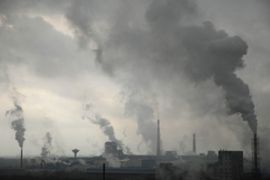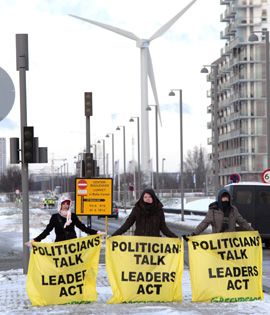Clock ticking on climate accord
Leaders at summit in Copenhagen hold late-night meetings to hammer out draft deal.

“There are deep differences in opinion and view on how we should solve this. We’ll try our best, until the last minutes of this conference,” Fredrik Reinfeldt, Swedens’s prime minister, said after the overnight talks ended.
| in depth |
|
|
A senior Indian negotiator said that there was “no agreement on even what to call the text – a declaration, a statement or whatever. They [developed nations] want to make it a politically binding document which we oppose.”
A negotiator for developing countries told Reuters that developed nations had offered to cut their carbon emissions by 80 per cent by 2050.
That proposal was dismissed by developing nations.
Elusive deal
Barack Obama, the US president, arrived in Copenhagen for the climax of the summit on Friday, joining head of state and government from about 120 nations.
The US was widely condemned for foot-dragging on climate change under former president George Bush, and Obama is hoping his presence at the summit’s finale will demonstrate an about-turn in US policy.
| In video |
|
G77 negotiatior Lumumba Diaping speaks about his expectations from the final negotiations |
Negotiators from 193 nations in total have been trying to hammer out a pact on carbon emissions for the last two weeks, but an agreement has so far proved elusive.
Al Jazeera obtained on Thursday an internal UN document which indicates that even the best pledges being offered to cut emissions may not be enough to curb global warming.
According to scientists, such a rise would be disastrous, condemning hundreds of millions of people to worsening drought, floods and storms.
A long list of world leaders, including many from nations most at risk from rising sea levels, have been pushing for delegates meeting in the Danish capital to limit the rise to between 1.5 and 2C.
Fund pledge
Obama’s attendance at the summit follows a pledge from Hillary Clinton, the US secretary of state, to contribute to a long-term fund worth $100bn a year by 2020 to help poor countries fund cleaner technology and shore up defences against worsening floods, drought, storms and rising seas.
 |
| Protesters are angry that two weeks of talks have made little progress [AFP] |
However, that pledge is contingent on an ambitious overall deal being completed at the talks.
Clinton also accused developing nations of backsliding on pledges to open their emissions control to scrutiny.
“There have been occasions in this past year when all the major economies have committed to transparency,” Clinton told a press conference on Thursday.
“Now that we are trying to define what transparency means and how we would both implement it and observe it, there’s a backing away from transparency – and that to us is something that undermines the whole effort that we’re engaged in,” she said.
Clinton said any deal that did not have sufficient transparency for all parties would be a “deal-breaker” for the US.
‘Facing failure’
China and India, two of the world’s biggest and fastest-growing carbon emitters, say they are willing to take voluntary measures to slow their growth of gas emissions.
But they are reluctant to accept tough international inspection and insist rich nations shoulder the main burden by accepting huge reduction targets.
“We should not continue to dwell on these issues that are dividing us. We should narrow our differences, otherwise we are facing a failure,” He Yafei, China’s vice foreign minister, told reporters.
 |
| French President Nicolas Sarkozy said failure to reach a deal would be “catastrophic” [AFP] |
Obama is due to address the morning plenary session before holding a bilateral meeting with Wen Jiabao, the Chinese prime minister, who will also laying out China’s position on emissions cuts in an address at the summit.
But in the run-up to Friday’s final day, the tone of government briefings indicated that few delegations were optimistic that a last-minute significant breakthrough was possible.
“Coming back with an empty agreement would be far worse than coming back empty-handed,” Robert Gibbs, the White House spokesman, told reporters before Obama left Washington.
Jose Manuel Barroso, the EU Commission chief, said he expected Obama to announce further US action to push things forward “because if they don’t do it, others will find an excuse also not to move.”
Nicolas Sarkozy, the French president, said on Thursday that the world faced a looming disaster if the summit failed to break the deadlock over carbon emissions.
“There is less than 24 hours. If we carry on like this, it will be a failure,” he said.
“Failure at Copenhagen would be catastrophic for all of us.”
‘Critical juncture’
On Thursday Angela Merkel, the German chancellor, warned prospects for a deal were “not good” as she criticised emissions pledges made by industrial nations as insufficient.
However Ban Ki-moon, the UN secretary general, was more optimistic, looking to talk up the prospects of an agreement saying he had “not seen anything that indicates we cannot seal a deal.”
“There are more than 130 leaders here. If they cannot seal a deal, who can?”
Rasmussen, who is also chairing the conference, said on Thursday the climate summit – widely-touted as the last chance for a global deal – was “at a critical juncture”.
“Now we rely on the willingness of all parties to take that extra step that would enable us to make the deal that is expected of us,” he said.
